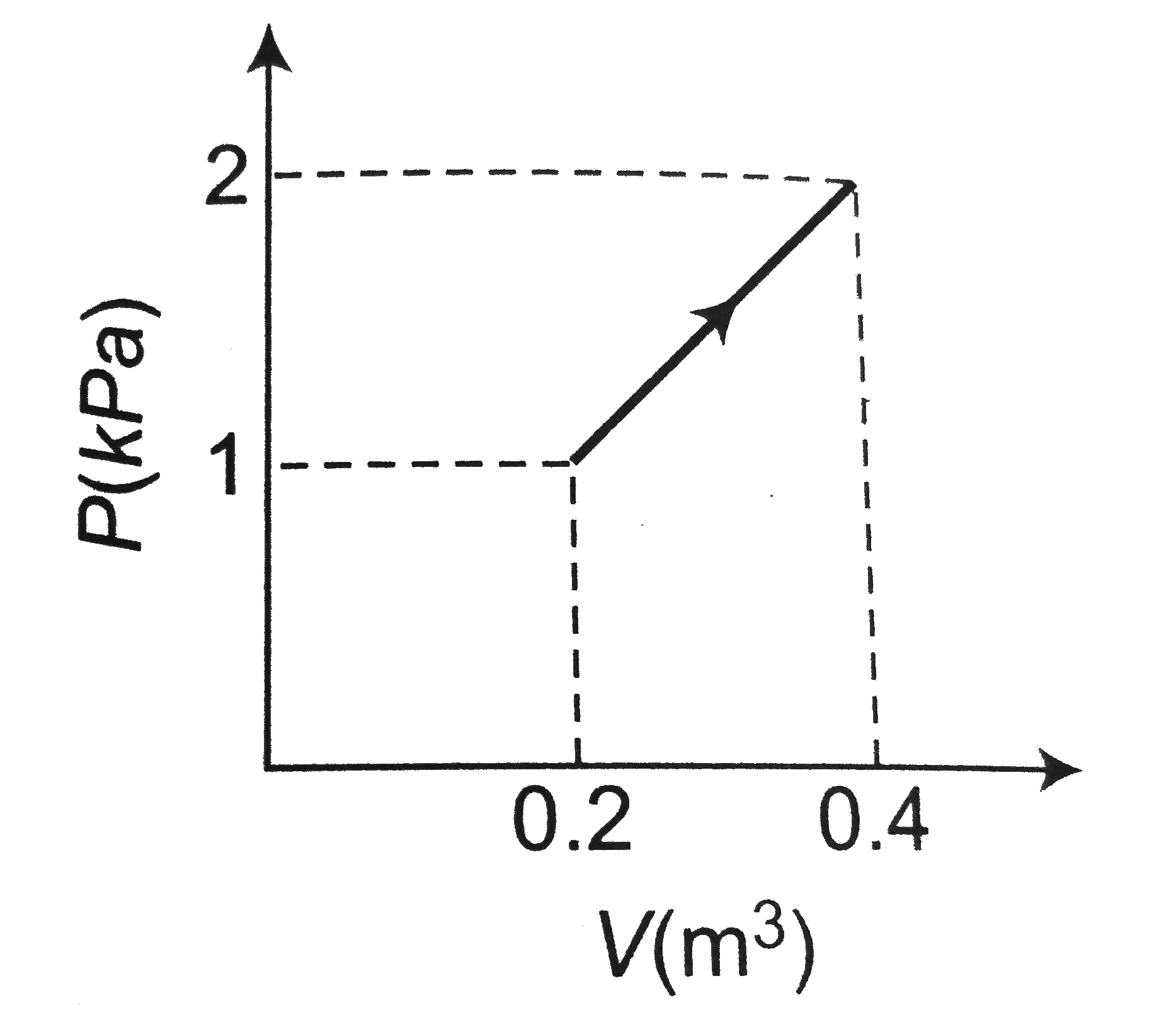A fixed mass of helium gas is made to undergo a process in which its pressure varies linearly from 1kPa to 2kPa, in relation to its volume as the latter varies from 0.2m3 to 0.4m3. The heat absorbed by the gas will be
300J
900J
1200J
1500J
The correct Answer is:C
ΔW=12(1+2)×103Nm2×(0.4−0.2)m3=300J

ΔU=nCVΔT=(P2V2−P1V1γ−1
=(3/2)[0.4×2−0.2×1]×103J=900J
ΔQ=ΔW+ΔU=1200J.
Topper's Solved these Questions
- KINETIC THEORY OF GASES AND THERMODYNAMICSBOOK - A2ZCHAPTER - KINETIC THEORY OF GASES AND THERMODYNAMICSEXERCISE - Assertion Reasoning
15 Videos
- KINETIC THEORY OF GASES AND THERMODYNAMICSBOOK - A2ZCHAPTER - KINETIC THEORY OF GASES AND THERMODYNAMICSEXERCISE - NEET Questions
55 Videos
- KINETIC THEORY OF GASES AND THERMODYNAMICSBOOK - A2ZCHAPTER - KINETIC THEORY OF GASES AND THERMODYNAMICSEXERCISE - Second Law Of Thermodynamics
29 Videos
- GRAVITATIONBOOK - A2ZCHAPTER - GRAVITATIONEXERCISE - Chapter Test
29 Videos
- MOCK TESTBOOK - A2ZCHAPTER - MOCK TESTEXERCISE - Motion With Constant Acceleration
15 Videos
Similar Questions
An ideal gas is taken through a process in which pressure and volume vary as P=kV2. Show that the molar heat capacity of the gas for the process is given by C=Cv+R3.
View SolutionAn ideal gas undergoes a process in which its pressure and volume are related as PVn=constant,where n is a constant.The molar heat capacity for the gas in this process will be zero if
View Solution
Knowledge Check
A gas undergoes a process in which its pressure P and volume V are related as VPn= constant. The bulk modulus of the gas in the process is:
AnPBP1/nCP/nDPnA gas undergoes a process in which its pressure P and volume V are related as VPn= constant. The bulk modulus of the gas in the process is:
AnPBP1/nCP/nDPnA gas undergoes a process in which its pressure p and volume V are related as Vnp = constant.The bulk modulus of the gas in this pressure is
Ap1/nBpnCnpDρn
A pressure of 10 kPa acts on an area of 0.3 m2. The force acting on the area will be :
View SolutionAn ideal diatomic gas with CV=5R2 occupies a volume V1 at a pressure P1. The gas undergoes a process in which the pressure is proportional to the volume. At the end of the process the rms speed of the gas molecules has doubled from its initial value.
Heat supplied to the gas in the given process is
View SolutionAn ideal diatomic gas with CV=5R2 occupies a volume V1 at a pressure P1. The gas undergoes a process in which the pressure is proportional to the volume. At the end of the process the rms speed of the gas molecules has doubled from its initial value.
The molar heat capacity of the gas in the given process is
View SolutionAn ideal diatomic gas occupies a volume V1 at a pressure P1 The gas undergoes a process in which the pressure is proportional to the volume . At the end of process the root mean square speed of the gas molecules has doubled From its initial value then the heat supplied to the gas in the given process is
View SolutionMolar heat capacity of an ideal gas in the process PVx = constant , is given by : C=Rγ−1+R1−x. An ideal diatomic gas with CV=5R2 occupies a volume V1 at a pressure P1. The gas undergoes a process in which the pressure is proportional to the volume. At the end of the process the rms speed of the gas molecules has doubled from its initial value.
Heat supplied to the gas in the given process is :
View Solution
